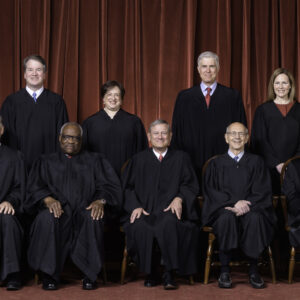The events on Monday, Jan. 22, 1973, were astonishing. The Tuesday newspapers captured the sign of the times — former President Lyndon Johnson died, which was the day’s lead story, not the Supreme Court’s monumental pro-abortion ruling on Roe v. Wade.
In fact, on the Los Angeles Times front page, the George Foreman-Joe Frazier boxing fight was above the abortion story (Foreman won by a knockout, by the way).
Chief Justice John Roberts, on that day, was a senior at La Lumiere college preparatory boarding school in Indiana. Roberts that day probably didn’t realize he later would be caught in the middle of a Roe Maelstrom, as Roe v. Wade was overturned by the Supreme Court at the end of June 2022.
“He’s a pragmatist,” said Arthur Cyr, a professor of political economy and world business at Carthage College in Kenosha, Wis. “Roberts tried to work things out to broker a deal, but he couldn’t do it this time.”
As Joan Biskupic, a Supreme Court biographer, wrote, “Roberts, who has forcefully pushed for conservative outcomes on race and religion, had tried to move incrementally here. He attempted to split the difference, to uphold the disputed Mississippi law prohibiting abortion after 15 weeks of pregnancy but to hold off on confronting Roe.”
He tried to strike a compromise, pluck off a conservative justice to join him … and win, 5-4, with the three liberals.
It is what it is.
Everything fell right into place, including good luck, for former president Donald Trump as conservatives forged a 6-3 super-majority on the Supreme Court.
We’re talking “ifs.”
—Start with 2016, an election year, Donald Trump vs. Hillary Clinton. Here’s what national correspondent and “numbers guru” Philip Bump wrote for The Washington Post on Dec. 1, 2016: “The most important states, though, were Michigan, Pennsylvania and Wisconsin. Trump won those states by 0.2, 0.7 and 0.8 percentage points, respectively — and by 10,704, 46,765 and 22,177 votes. Those three wins gave him 46 electoral votes; if Clinton had done one point better in each state, she’d have won the electoral vote, too.”
Trump ended up defeating Clinton 304 to 227 in the Electoral College, though Clinton won the popular vote by nearly 3 million.
Reverse those 46 electoral votes, and the outlook changes big-time for Hillary. That means no Neil Gorsuch, no Brett Kavanaugh, no Amy Coney Barrett.
Elections have consequences; Trump was lucky as hell.
—Justice Ruth Bader Ginsburg, a true liberal, died Sept. 18, 2020, the same day the newly christened Dwight D. Eisenhower Memorial opened to the public. It was a picturesque blue sky on a cool, breezy afternoon that Friday in Washington.
In a morbid sort of way, Ginsburg’s death was a gift of riveting proportions for Trump. He and Senate Majority Leader Mitch McConnell scurried to get Barrett confirmed before the presidential election.
Timing.
The last president before Trump to nominate three Supreme Court justices in one term was Richard Nixon, who had four in his first term.
Justice Thurgood Marshall, a liberal, announced his retirement from the Supreme Court on June 27, 1991, because of declining health; ultra-conservative Clarence Thomas, appointed by Republican George H.W. Bush, joined the court on Oct. 23, 1991.
Marshall died FOUR days after Democrat Bill Clinton’s first inauguration in 1993. If only …
At his last news conference regarding retirement, Marshall told reporters when asked if he should be replaced by a Black person, or “Negro” as Marshall preferred: “I don’t think (race) should be used as an excuse one way or the other. … I mean for picking the wrong Negro, and saying, ‘I’m picking him because he is a Negro.’ I am opposed to that.”
Then, he added: “There’s no difference between a white snake and black snake. They’ll both bite.”
We’ve seen the latter with Thomas, who has assured us more blockbuster changes lie ahead for “settled law” or “precedent-setting rulings.”
Many of us thought Roe v. Wade was “settled” … but apparently not.
Let’s be real: Barrett is the key to the conservatives’ super-majority. She serves as a firewall or buffer against Roberts in case he decides to vote with liberals, which he has done before.
Now, Roe v. Wade surely will be on the ballot — and not just inflation and gas prices — this fall and in 2024.
Added Cyr, “It’s probably the single most emotional issue today. It should be helpful for Democrats; it will weaken the Republican surge.”
We shall see.

